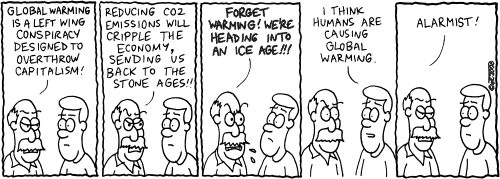 Arguments
Arguments
 Software
Software
 Resources
Comments
Resources
Comments
 The Consensus Project
The Consensus Project
 Translations
Translations
 About
Support
About
Support


Latest Posts
- Sabin 33 #22 - How does waste from wind turbines compare to waste from fossil fuel use?
- Clean energy generates major economic benefits, especially in red states
- 2025 SkS Weekly Climate Change & Global Warming News Roundup #13
- Skeptical Science New Research for Week #13 2025
- Climate skeptics have new favorite graph; it shows the opposite of what they claim
- Sabin 33 #21 - How does production of wind turbine components compare with burning fossil fuels?
- China will need 10,000GW of wind and solar by 2060
- 2025 SkS Weekly Climate Change & Global Warming News Roundup #12
- Skeptical Science New Research for Week #12 2025
- Climate Fresk - a neat way to make the complexity of climate change less puzzling
- Sabin 33 #20 - Is offshore wind development harmful to whales and other marine life?
- Do Americans really want urban sprawl?
- 2025 SkS Weekly Climate Change & Global Warming News Roundup #11
- Fact brief - Is waste heat from industrial activity the reason the planet is warming?
- Skeptical Science New Research for Week #11 2025
- Visualizing daily global temperatures
- Sabin 33 #19 - Are wind turbines a major threat to wildlife?
- The National Hurricane Center set an all-time record for forecast accuracy in 2024
- 2025 SkS Weekly Climate Change & Global Warming News Roundup #10
- Fact brief - Is Greenland losing land ice?
- The Cranky Uncle game can now be played in 16 languages!
- Skeptical Science New Research for Week #10 2025
- Climate Adam: Protecting our Planet from President Trump
- Sabin 33 #18 - Can shadow flicker from wind turbines trigger seizures in people with epilepsy?
- Cuts to U.S. weather and climate research could put public safety at risk
- 2025 SkS Weekly Climate Change & Global Warming News Roundup #09
- Fact brief - Are high CO2 levels harmless because they also occurred in the past?
- Skeptical Science New Research for Week #9 2025
- Is CO2 plant food? Why are we still talking about this?
- Sabin 33 #17 - Does low-frequency noise from wind turbines cause 'wind turbine syndrome'?
Printable Version | Link to this page
Comments 1 to 7:
-
XPLAlN at 20:50 PM on 13 April, 2008Ha! Spot on!
-
John Cross at 04:01 AM on 14 April, 2008LOL: It now has a place on my office door right beside Freedom from Reality. In fact it complements it rather well. Thanks, John
-
Quietman at 08:08 AM on 14 April, 2008While I seen the writing in blogs of such people as despicted in the cartoon, what makes it funny is that it is the exact opposite of what I see most often, and because of the post times I can even tell what part of the world these things come from. From a psychological and cultural viewpoint such humor and attitude are very interesting.
-
frankbi at 21:44 PM on 14 April, 2008Hah. I just wrote a blog post about how the Adam Smith Institute's `argument' against green jobs. Summary: creating jobs is bad. No, I didn't make that up. http://tinyurl.com/3ogc8y
-
Quietman at 07:48 AM on 15 April, 2008frankbi You are right on, that "economist" is definately looney. We could use a few of those jobs here in PA.
-
LAI at 05:34 AM on 19 June, 2008frankbi/Quietman I'd suggest reading Walter Williams, Henry Hazlitt or others on this idea before you write it off as completely "looney." I find it hard to disagree with anything "green" these days, but his logic is sound. Trashing a conservationist idea because it violates sound economic principle might well be missing the bigger issue, but attacking the logical economic theory doesn't make sense either. We need to find the common ground that everyone can buy into. Good article by Williams here: http://tinyurl.com/4oeufl and for Hazlitt I'd point you to this book: http://tinyurl.com/529bop.
-
frankbi at 05:34 AM on 11 July, 2008LAI: My dear Sir, Worstall's logic and Hazlitt's logic certainly can't both be "sound" at the same time, because they happen to contradict each other. Worstall thinks more jobs is bad, Hazlitt thinks more jobs is good. I think you may need to revise your idea of what constitutes "sound" "logic".
You need to be logged in to post a comment. Login via the left margin or if you're new, register here.
THE ESCALATOR

(free to republish)






















































 0
0  0
0





Comments